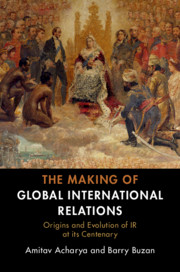Book contents
- The Making of Global International Relations
- The Making of Global International Relations
- Copyright page
- Contents
- Tables
- Acknowledgements
- Abbreviations
- Introduction
- 1 The World up to 1919: The Making of Modern International Relations
- 2 International Relations up to 1919: Laying the Foundations
- 3 The World 1919–1945: Still Version 1.0 Global International Society
- 4 International Relations 1919–1945: The First Founding of the Discipline
- 5 The World after 1945: The Era of the Cold War and Decolonisation
- 6 International Relations 1945–1989: The Second Founding of the Discipline
- 7 The World after 1989: ‘Unipolarity’, Globalisation and the Rise of the Rest
- 8 International Relations after 1989
- 9 The Post-Western World Order: Deep Pluralism
- 10 Towards Global International Relations
- References
- Index
5 - The World after 1945: The Era of the Cold War and Decolonisation
Published online by Cambridge University Press: 08 February 2019
- The Making of Global International Relations
- The Making of Global International Relations
- Copyright page
- Contents
- Tables
- Acknowledgements
- Abbreviations
- Introduction
- 1 The World up to 1919: The Making of Modern International Relations
- 2 International Relations up to 1919: Laying the Foundations
- 3 The World 1919–1945: Still Version 1.0 Global International Society
- 4 International Relations 1919–1945: The First Founding of the Discipline
- 5 The World after 1945: The Era of the Cold War and Decolonisation
- 6 International Relations 1945–1989: The Second Founding of the Discipline
- 7 The World after 1989: ‘Unipolarity’, Globalisation and the Rise of the Rest
- 8 International Relations after 1989
- 9 The Post-Western World Order: Deep Pluralism
- 10 Towards Global International Relations
- References
- Index
Summary
- Type
- Chapter
- Information
- The Making of Global International RelationsOrigins and Evolution of IR at its Centenary, pp. 112 - 137Publisher: Cambridge University PressPrint publication year: 2019

